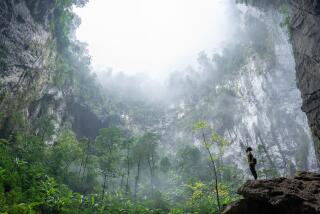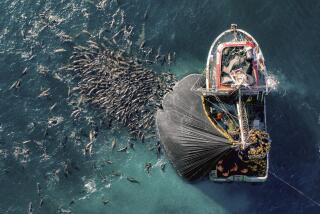Attenborough continues to bring natureâs wonders to the small screen
David Attenborough is the first to admit that TV shows about crusty old fossils are a tough sell for todayâs âAvatarâ-addicted crowd. But the renowned natural scientist hasnât survived a half century in television without learning how to adapt.
So, he explained during an interview, expect to see plenty of computer-generated images and other feature film effects that make ancient creatures come alive as vividly as James Cameronâs big, blue Naâvi in his latest special âFirst Life,â which premieres Sunday on Discovery Channel.
âIf we went out and asked people if they wanted to see a program about pre-Cambrian fossils, what do you think theyâd say?â said Attenborough, sitting poolside at the Beverly Hilton earlier this year. âUnless you present it in a thrilling and exciting way, youâre wasting everyoneâs time.â
The two-hour program traces the origins of life back half a billion years and shines a light on recent groundbreaking â unusual â discoveries, such as the existence of a millipede the size of a Volkswagen. That odd creature, and another one that had 5,000 lenses for eyes, are the foundation for animal life, he said.
âThe reality is way more interesting than something you could make up,â said executive producer Anthony Geffen, whose London-based Atlantic Productions created the show. âWe can be scientifically accurate and bring these creatures to life in a way that we never could before, with cutting edge techniques.â
âFirst Lifeâ goes further back in the planetâs history than has ever been presented on TV, Attenborough said. New fossil discoveries, the latest research and technologically enhanced ways to interpret the data have provided scientists with a clearer picture of how ancient creatures lived, hunted and evolved.
âThis was the big unknown â a major gap in our knowledge that needed to be filled,â said the 84-year-old who was also behind such projects as âPlanet Earthâ and âThe Life of Birds.â âItâs thrilling to discover a whole category of life to which ultimately weâre all related. And to be able to document it this late in the day â while Iâm still vertical â is a huge privilege.â
Discovery Channelâs President and General Manager Clark Bunting said there are few personalities left like Attenborough who can engage and educate audiences.
âHeâs able to ignite the wonder that we all had as kids and mightâve lost somewhere along the way to adulthood,â Bunting said. âThereâs still a twinkle in his eye. He has true passion for this subject.â
Though he made his reputation on scrutinizing the past, Attenborough has always tried to incorporate the latest technology to juice his storytelling. Early in his career at the BBC, he was among the pioneers of adopting color TV and became one of the first network executives to fully employ it on the small screen. And more recently, he has embraced the latest technology for a couple projects in the works â a 3-D film on pterodactyls and an Imax movie about the Antarctic.
A world traveler whoâs filmed giant tortoises in the Galapagos Islands and wildebeest migrations in the Serengeti, Attenborough has been known to break out in Swahili or tell tales about meeting Elsa the âBorn Freeâ lioness. (One of his favorites â Elsa climbed onto his chest as he napped and he was greeted with the animal fouling the whole room with her âterrible halitosisâ). His latest special took him from the Canadian Rocky Mountains to Australia to Morocco.
A lifelong conservationist, Attenborough is worried about climate change and overpopulation, but heâs encouraged by the environmental awareness of young people. He credits TV, long criticized for being an âidiot box,â for fueling eco-friendly attitudes.
After all, more than half of the worldâs population is urbanized, Attenborough said, and is cut off from nature. The only wild creature people may ever see is a rat or a pigeon, he added, âyet paradoxically, they know more about the variety and beauty of the world than anybody in history through television.â
âThe natural world is in greater peril than ever, and the peril comes from us, and weâre the only species that can do anything about it,â he continued. âIf people have no feeling for the natural world and do nothing about it, weâre in real trouble.â
More to Read
The complete guide to home viewing
Get Screen Gab for everything about the TV shows and streaming movies everyoneâs talking about.
You may occasionally receive promotional content from the Los Angeles Times.






